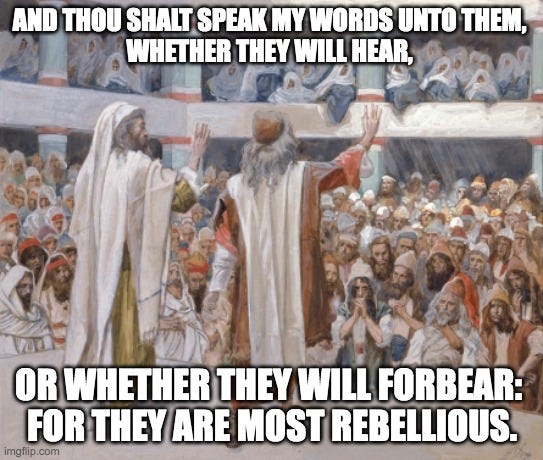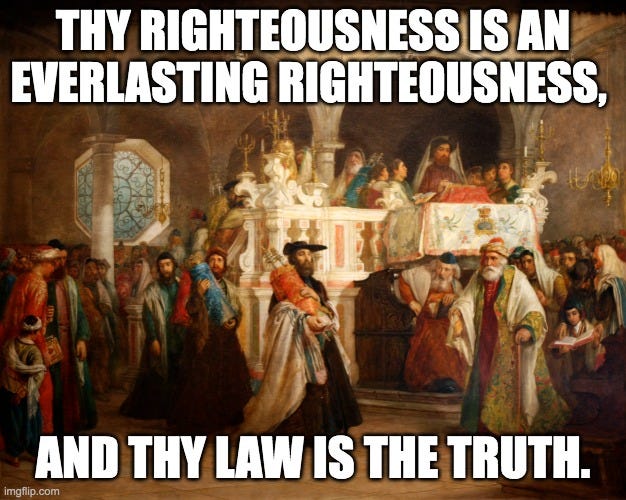I used to work in a hospital. Indeed I did work in several hospitals. And they frequently had a sign which read ‘No Admittance’. And, anarchist that I was, I frequently walked right through those doors.
No, not because I’m an anarchist. I’m not. It was because the sign ‘No Admittance’ didn’t apply to me. I worked there. The sign was meant for the ‘general public’, and there was nothing general about me. I was a nurse or an ambulance driver. The door had literally been made to let me in… and keep others out.
No Admittance
There is a fallacy, which I am calling the ‘No Admittance’ fallacy, which confuses the general and the specific. It doesn’t recognise that there might be a general rule which doesn’t apply to specific groups, or specific circumstances.
Let’s look at the Levirate Law. The ‘general’ rule in Scripture is that a man is not to marry his brother’s wife, even after his brother is dead. This law is part of the general run of what we call the ‘incest’ laws, and include all sorts of forbidden relationships.
But then there is another law, the Levirate Law. And it says that a man MUST marry his brother’s wife! How is this not a flat contradiction? Well, the Levirate Law is not a general law, it is a specific law. It gives some very specific conditions and says that under those conditions, a man must marry his brother’s wife.
The door marked ‘No Admittance’ kept people out of a room they weren’t supposed to go in, or go through. The general mass of people, walking down that hallway, would look at the door, see the sign, and, even if they wanted to go that direction, would mutter to themselves and move on, seeking another way to get where they wanted to go.
Then, minutes later, my partner and I would come along, pushing a stretcher with a moaning twelve-year-old boy on it, and just casually go right into the door! Not even bothering to read the ‘No Admittance’ sign! Because, of course, one reason that others weren’t allowed to go through that door was because we were. To leave a good path for us to go where we wouldn’t be having to push through a general crowd.
When a man died, having married a wife and having no children by her, it was important that man’s legacy continue, and his inheritance be secured. Thus someone would have to make sure that a child arose to take his name. The way God handled that, in the law, was that the man’s brother would go in unto his wife, and the first child from that union would not take the brother’s name, and receive the brother’s inheritance… but would take the name of the man who died, and receive his inheritance!
So the general rule was ‘you can’t marry your dead brother’s wife’ (or your living brother, for that matter). But the specific rule was ‘in these particular circumstances, you have to marry your dead brother’s wife.
No Admittance Hermeneutics
This makes a general rule of hermeneutics. Scripture speaks both generally and specifically. And the specific overrules the general. In general: No Admittance. In specific: ambulance drivers, nurses, lab techs… this is your door to go through.
I have often, and will no doubt do so again, discussed ‘gender roles’ in Scripture. The head covering, women speaking in church, the importance of childbearing and home-keeping… all sorts of general roles. In those discussions, this principle is of paramount importance. We cannot merely find a verse that says ‘Do such and such’ and ignore the verse that says ‘Women are not to do such and such’. They are no more contradictory than the no admittance sign.
In order to do good hermeneutics on an issue, one must study both the general rule and the specific exceptions or additions. The ordinary man can marry a divorced woman, but a priest cannot. The ordinary woman who marries outside of the priesthood cannot eat from the offerings, the widow can. Pants don’t need to be worn under the robe… unless you are a priest.
It Doesn’t Mean
The second law of hermeneutics that I wish to deal with is related to the first in that a)I could have called it the ‘No Admittance Fallacy’ and made sense of the title and b) It is often used by the same people. I call this the ‘It Doesn’t Mean’ fallacy.
Here is how this fallacy works. Someone reads a verse they don’t like and, in an attempt to get out of what the verse clearly says, they say “This doesn’t mean…”.
Now, no one is saying that every verse means everything, so there is a very real and very valid sense in saying of a given verse ‘It doesn’t mean…’. But I believe that the rules of hermeneutics insist that the process has to look like this:
A) This is what the verse DOES mean.
B) Here are all of the reasons that the Scriptures give for that meaning
C) Given (A) and (B), here is what the verse *doesn’t mean*.
An Example from the Law
To avoid giving my Christian audience too much of a shock, and because I’ve mentioned it already, and to annoy a certain reader of mine, let’s begin with the levirate law. The law says, “… her husband's brother shall go in unto her, and take her to him to wife, and perform the duty of an husband's brother unto her.”
The obvious reading of this is that ‘shall’ means, like, ‘shall’. ‘Should’, ‘This is the thing to do’, ‘Don’t not do this thing.’ Etc.
But along comes the modern interpreter and says, “This doesn’t mean that the brother should do this. There is an escape clause and that is what he should do instead.” Cute.
Now the way I think that this should work is that we should look at the law and say:
A) Here is what the verse means: “…her husband's brother shall go in unto her, and take her to him to wife, and perform the duty of an husband's brother unto her.”
B) Because, “And it shall be, that the firstborn which she beareth shall succeed in the name of his brother which is dead, that his name be not put out of Israel.”
C) It does not mean that any random brother can take his brother’s wife. That’s incest.
IOW, the point of the passage, what should happen, is that the man whose brother has died without issue should go into unto his brother’s wife, and should perform his duty unto her, so that her first born will succeed in the name of his brother and so that his brother’s name will not be put out of Israel.
When along comes the the modern interpreter asking about the ‘escape clause’, then I do the analysis again:
A) Here is what the verse means, “…let his brother's wife go up to the gate unto the elders, and say, My husband's brother refuseth to raise up unto his brother a name in Israel, he will not perform the duty of my husband's brother.
Then the elders of his city shall call him, and speak unto him: and if he stand to it, and say, I like not to take her;
Then shall his brother's wife come unto him in the presence of the elders, and loose his shoe from off his foot, and spit in his face, and shall answer and say, So shall it be done unto that man that will not build up his brother's house.
And his name shall be called in Israel, The house of him that hath his shoe loosed.
B) Because
The man like not to take his brother's wife
[He] refuseth to raise up unto his brother a name in Israel
he will not perform the duty of my husband's brother
he stand to it, and say, I like not to take her;
[he] will not build up his brother's house
(In Modern English: You selfish and unGodly pig.)
C) It does not mean that a man should do all these vile things.
When a man uses this ‘escape clause’, all of the reasons why this law are put here are left undone, and he is to be actively shamed and reviled.
To Be Continued
Now that the Christians have patted themselves on the back, let’s turn to, “Let your women keep silence in the churches”…
or perhaps lets turn to, “ every woman that prayeth or prophesieth with her head uncovered dishonoureth her head: for that is even all one as if she were shaven….”
or, “ I will, therefore, that the younger women marry, bear children, guide the house, give none occasion to the adversary to speak reproachfully….”
We might well continue our discussion with any of these passages, or dozens more where our temptation is to begin our explanation with ‘This doesn’t mean’. And continue with even more things it doesn’t mean. But we need to start with an explanation of what it does mean, and why it is there, and how we are going to do our best to live in obedience to it.
Conclusion
Whenever we have a theological discussion, it is important we get our theological ducks in order. And to avoid logical fallacies and problematic reasoning.
One of the rules of interpreting Scripture is that we understand it speaks both specifically and generally. That a general rule might have specific exceptions. And that these aren’t contradictory.
Another important rule is the importance of ‘It means’. Before we have worked out what a given Scripture does mean, and why Scripture gives for that meaning, we cannot begin to discuss what it ‘doesn’t mean’. Doing so is often an excuse for simply ignoring it.
Thank you for reading Von’s Substack. I would love it if you commented! I love hearing from readers, especially critical comments. I would love to start more letter exchanges, so if there’s a subject you’re interested in, get writing and tag me!
Being ‘restacked’ and mentioned in ‘notes’ is very important for lesser-known stacks so… feel free! I’m semi-retired and write as a ministry (and for fun) so you don’t need to feel guilty you aren’t paying for anything, but if you enjoy my writing (even if you dramatically disagree with it), then restack, please! Or mention me in one of your own posts.
If I don’t write you back it is almost certain that I didn’t see it, so please feel free to comment and link to your post. Or if you just think I would be interested in your post!
Thanks again, God Bless, Soli Deo gloria,
Von
Links
Theology
Legalism: A less than useful word
Is God a Metaphor
Forcing yourself to believe
The Abolitionist
I’m against Child Murder.
We don’t Stone People for Adultery Anymore: Dealing with some non-sequitors
Non-sequiturs and Edge Cases: Dealing with some common illogical arguments from child-murderers.
Talking about the Baby: How language affects our view of child murder.
The Language of Murder: Let’s use the right language to discuss murdering babies.
Pizza Discussion
The “Pizza Discussion” is a letter exchange with
. In it we discuss issues of the importance of religion, God, and morality… comparing them to the importance of Pizza and Sushi. It started when he posted a post entitled‘Religion’and specifically comes from this line: “Arguing over religion strikes me as the same as arguing over whether sushi or pizza is better.”
has also contributed.
Sushi, Pizza, and the Existence of God
Pizza, Sushi, and the Definition of Morality
The knowledge of Pizza, Defintion of Sushi, and Existence of Food
A Piece of Pi // Podcast Version
A Pound of Pizza
The Source of Sushi
Out of the main line, a post about arguing itself:









Context! Original audience! Figures of speech!